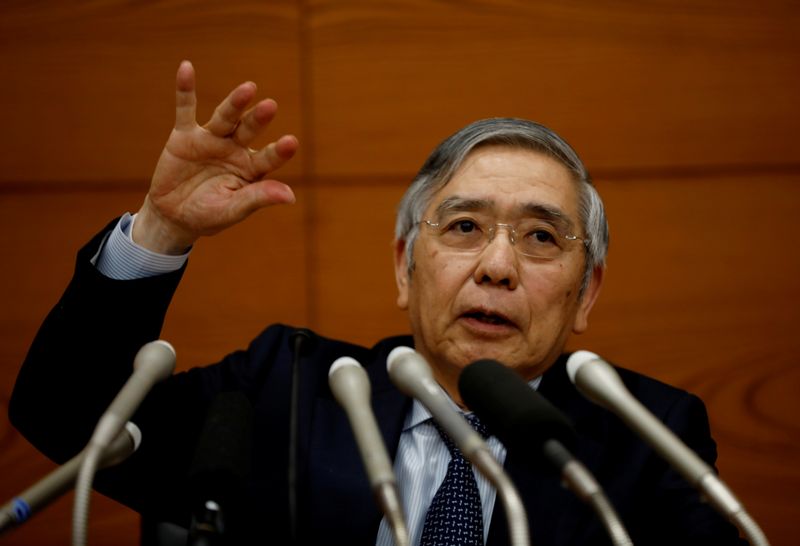By Leika Kihara
TOKYO (Reuters) -Bank of Japan (BOJ) Governor Haruhiko Kuroda on Monday brushed aside the chance of a near-term exit from ultra-loose monetary policy, although markets and policymakers are signalling an increasing focus on what comes after Kuroda's tenure ends.
Investors have continued to push up Japanese government bond (JGB) yields on expectations the BOJ will phase out its yield control under a new governor when Kuroda's second five-year term comes to a close in April of next year.
The shift in attention towards a post-Kuroda era was also evident in comments by Prime Minister Fumio Kishida on Monday that a decision on whether to revise Japan's decade-old blueprint for beating deflation will be made after a new BOJ governor is appointed.
"It's something for after the new BOJ governor is decided," Kishida said in a seminar, referring to possible changes the government might seek to its joint statement with the BOJ that commits the central bank to hitting a 2% inflation target at the earliest date possible.
The BOJ shocked markets last week with a surprise widening of the allowance band around its 10-year JGB target, a move that aimed at easing some of the cost of prolonged stimulus.
Kuroda said on Monday that last week's decision was intended to enhance the effect of its ultra-easy policy, rather than a first step towards withdrawing its massive stimulus programme.
"This is definitely not a step toward an exit. The Bank will aim to achieve the price target in a sustainable and stable manner, accompanied by wage increases, by continuing with monetary easing under yield curve control," Kuroda said in a speech delivered to the business lobby Keidanren.
But Kuroda said wage growth will likely increase gradually due to intensifying labour shortages and structural changes in Japan's job market, which are leading to higher pay for temporary workers and a rise in the number of permanent workers.
"Labour market conditions in Japan are projected to tighten further, and firms' price- and wage-setting behaviour is also likely to change," Kuroda said.
"In this sense, Japan is approaching a critical juncture in breaking out of a prolonged period of low inflation and low growth," he said.
The strength of wage growth is seen as key to how soon the BOJ could raise its yield curve control (YCC) targets, which are set at -0.1% for short-term interest rates and around 0% for the 10-year bond yield.
The BOJ's relentless bond buying to defend the yield cap has drawn increased public criticism for distorting market pricing and causing an unwelcome yen fall that pushed up the cost of importing already expensive raw materials.
Sources have told Reuters that Kishida's administration will consider revising next year the joint statement that focuses on steps to beat deflation - a goal that has become out of sync with recent rises in inflation, and has prevented the BOJ from adjusting monetary policy more flexibly.
Analysts say any such revision would heighten the chance of a tweak to the BOJ's ultra-low interest rates.

The two-year JGB yield briefly rose to 0.225% on Monday, the highest since 2015, on expectations of a near-term rate hike. The 10-year JGB yield also edged up to 0.445%, near the new band's 0.5% upper limit.
Kishida offered few clues on his choice as the next BOJ governor, saying only that the new appointee would be someone "deemed most appropriate" at the time.